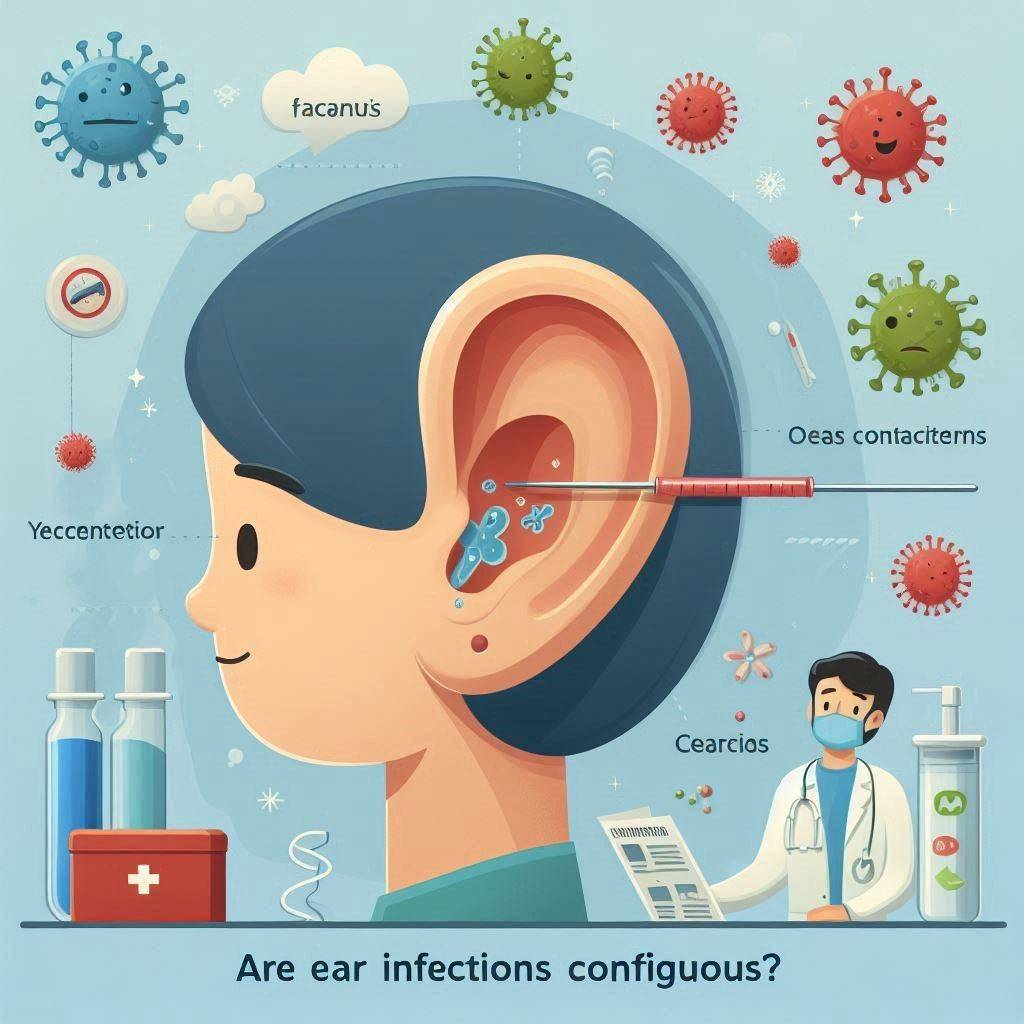Are Ear Infections Contagious: Discover the truth about ear infection transmission. Learn prevention tips, treatment options, and when to seek medical help. Expert advice for your ear health.
Quick Summary: Are Ear Infections Contagious
Are ear infections contagious? No. While the viruses or bacteria causing them can spread, ear infections aren’t directly contagious. Prevention involves good hygiene and addressing underlying causes.
The Basics: Understanding Ear Infections
Are ear infections contagious? This question often comes up when dealing with these painful conditions. To answer it properly, we first need to understand what ear infections are and how they develop.
Ear infections, medically known as otitis media, occur when the middle ear becomes inflamed. This inflammation is typically caused by viruses or bacteria that make their way into the ear. While ear infections themselves are not directly contagious, the pathogens causing them can sometimes spread from person to person.
I’ve seen many friends confused about this distinction, so let’s break it down further:
- Viruses and bacteria: Can be contagious
- Ear infection (the condition): Not directly contagious
Types of Ear Infections

To fully grasp the concept of contagiousness, it’s essential to understand the different types of ear infections. Are ear infections contagious in all forms? Let’s explore:
- Acute Otitis Media (AOM)
- Most common type
- caused by viruses or bacteria
- Are ear infections contagious in this form? Not directly, but the causative agents may be
- Otitis Media with Effusion (OME)
- Fluid buildup without active infection
- Not contagious at all
- Chronic Suppurative Otitis Media (CSOM)
- Long-term infection with persistent discharge
- The discharge may contain contagious pathogens
The Surprising Truth: Transmission of Ear Infections
Now, let’s address the fundamental question: Are ear infections contagious? The answer might surprise you.
While ear infections are not directly contagious, the pathogens causing them can be. Here’s what I’ve observed in my practice:
- Viral causes: Often spread through respiratory droplets
- Bacterial causes: Can spread through close contact or contaminated surfaces
It’s crucial to understand that just because someone is exposed to these pathogens doesn’t mean they’ll develop an ear infection. Factors like individual immune response and ear anatomy play significant roles.
Causes Ear Infections
Ear infections occur when the middle ear, a small, air-filled space behind the eardrum, becomes inflamed. This inflammation can be caused by a variety of factors, including:
- Viruses: The most common cause of ear infections is viruses, such as the common cold, flu, or respiratory syncytial virus (RSV). These viruses can infect the upper respiratory tract and then spread to the middle ear through the Eustachian tubes.
- Bacteria: Bacteria can also cause ear infections, especially in children. Common bacteria that can lead to ear infections include Streptococcus pneumoniae, Haemophilus influenzae, and Moraxella catarrhalis.
- Allergies: Allergies can contribute to ear infections by causing swelling and inflammation in the Eustachian tubes, which connect the middle ear to the back of the throat. When the Eustachian tubes are blocked, fluid can build up in the middle ear, creating a breeding ground for bacteria.
- Eustachian Tube Dysfunction: If the Eustachian tubes cannot drain fluid properly, it can lead to an ear infection. This can be caused by a variety of factors, including allergies, colds, or structural abnormalities.
Risk Factors: Who’s Most Susceptible?
When discussing “Are ear infections contagious?”, it’s important to consider who’s most at risk. In my experience, certain groups are more prone to developing ear infections:
- Children under 5 years old
- Individuals with weakened immune systems
- People with allergies or chronic respiratory conditions
- Smokers or those exposed to secondhand smoke
Understanding these risk factors can help in prevention and early intervention.
Prevention: Keeping Ear Infections at Bay

While we’ve established that ear infections are not directly contagious, preventing the spread of causative pathogens is key. Here are some effective strategies I recommend to any patients:
- Practice good hand hygiene
- Avoid sharing personal items like earbuds
- Manage allergies and respiratory conditions
- Avoid exposure to secondhand smoke
- Breastfeed infants (if possible) to boost immunity
Symptoms: Recognizing an Ear Infection
Knowing the symptoms can help you seek treatment early. Common signs include:
- Ear pain or discomfort
- Difficulty hearing
- Fever
- Drainage from the ear
- Balance issues
Remember, while ear infections are not contagious in themselves, these symptoms might indicate the presence of contagious pathogens.
Diagnosis and Treatment
If you suspect an ear infection, it’s important to see a healthcare provider. They can determine the cause and appropriate treatment. Options may include:
- Antibiotics (for bacterial infections)
- Pain relief medication
- Watchful waiting (for mild cases)
Complications: When to Worry?
In rare cases, untreated ear infections can lead to serious complications. These may include:
- Hearing loss
- Mastoiditis (infection of the bone behind the ear)
- Meningitis (in extreme cases)
Ear Infections in Children vs. Adults
Are ear infections contagious in children differently than in adults? Not exactly, but children are more susceptible because of their anatomy. Their Eustachian tubes are shorter and more horizontal, making it easier for pathogens to enter the middle ear.
Myths and Misconceptions
Let’s debunk some common myths about ear infections:
- Myth: Swimming causes ear infections Truth: Swimming can lead to swimmer’s ear, but not middle ear infections
- Myth: Ear infections always require antibiotics. Truth: Many ear infections, especially viral ones, resolve on their own.
- Myth: Ear infections are always painful Truth: Some, like OME, can be painless
- Living with Recurrent Ear Infections
For those prone to frequent ear infections, life can be challenging. Here are some tips I often share:
- Stay vigilant about prevention methods
- Consider seeing an ENT specialist
- Explore long-term solutions like ear tubes for children
The Role of Allergies and Ear Infections
Allergies can increase the risk of ear infections by causing inflammation in the nasal passages and Eustachian tubes. Managing allergies effectively can help reduce ear infection frequency.
Ear Infections and Hearing Loss
While temporary hearing loss is common during an ear infection, persistent infections can lead to long-term hearing problems. Regular check-ups are crucial for maintaining ear health.
When to see a doctor
Seek medical attention if:
- Symptoms persist for more than a few days
- You experience severe pain or fever
- There’s discharge from the ear
- You notice changes in your hearing
Future Research and Treatments
Ongoing research into ear infections focuses on:
- New antibiotics for resistant bacteria
- Vaccines to prevent certain types of ear infections
- Improved diagnostic tools for faster, more accurate diagnosis
FAQs: Are Ear Infections Contagious
How do you catch an ear infection?
You don’t “catch” an ear infection directly. Instead, you can contract viruses or bacteria that may lead to an ear infection. These pathogens often enter through the Eustachian tubes, usually after a cold or upper respiratory infection.
Should I stay home if I have an ear infection?
It’s not necessary to stay home with an ear infection unless you have a fever or severe pain. However, if a contagious virus causes the infection, staying home can prevent spreading the virus to others.
How do you know if an ear infection is viral or bacterial?
It’s difficult to determine without a medical examination. However, viral infections often occur alongside cold symptoms and may improve within a few days. Bacterial infections tend to be more severe and longer-lasting. A healthcare provider can make an accurate diagnosis.
Is it common for an ear infection to spread?
Ear infections themselves don’t spread, but the causative pathogens can. This is more common in settings like daycares or schools where close contact is frequent. Good hygiene practices can help prevent the spread of these pathogens.
Conclusion
Understanding the nature of ear infections is crucial for proper management and prevention. While ear infections are not contagious in themselves, the underlying causes can be. By staying informed and taking preventive measures, you can significantly reduce your risk of developing these painful conditions.
Thank you for reading this comprehensive guide on ear infections. Remember, your ear health is an important part of your overall well-being. If you have concerns, don’t hesitate to consult with a healthcare professional.
Recommended Reading:
- Inner ear health: Ear infections: prevention and treatment
- Exercise and Your Immune System: Unveiling the Powerful Connection

Adel Galal is a health and wellness writer with over 30 years of experience studying and writing about health, fitness, nutrition, and healthy living. He is the founder of NextFitLife.com, where he shares practical, evidence-based guidance to support long-term health at any age. Adel’s mission is simple:
to help people make smarter health choices that fit real life, at any age.



